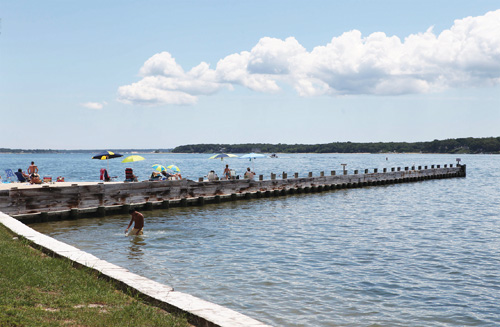Clean water legislation going to vote in state Senate, Assembly

After an up-Island assemblyman recently pitched a clean water bill creating a timeline for improving wastewater treatment systems, matching legislation has been proposed in the state Senate, potentially clearing the way for sweeping water quality reform in Albany before the end of next week.
If signed into law by Gov. Andrew Cuomo, the bill stands to affect property owners throughout Nassau and Suffolk counties.
State Assemblyman Robert Sweeney (D-Lindenhurst) unveiled his version of the bill, known as the “Long Island Water Quality Control Act,” at the end of last month.
Meanwhile, state Sen. Kenneth LaValle (R-Port Jefferson) responded by laying an updated version of the legislation on the table Tuesday evening — with just 10 days left in the 2014 legislative session — that includes minimal changes considered “mostly technical in nature.”
Mr. Sweeney’s bill has been amended to mirror Mr. LaValle’s.
Bob DeLuca, speaking on behalf of Group for the East End and the Clean Water Partnership, said the updated bill “represents the single most important piece of water quality planning and protection legislation in 30 years.”
Starting in 2017, new construction and any big renovation projects on Long Island would need modern waste treatment systems installed to better filter nitrogen from reaching ground and surface waters, according to the bills. High nitrogen levels in area waters have been feeding harmful algal blooms, which in turn have damaged the local ecosystem by depriving bodies of water of oxygen and negatively affecting area fisheries. Nitrogen levels have likewise been increasing in area drinking water.
Also starting in 2017, no property owner would be allowed to repair failing cesspools in certain “priority areas” — areas that Nassau or Suffolk counties have not yet formally identified. Those residents would instead have to install newer denitrification systems. In addition, any sprinkler systems installed after the start of 2016 must be equipped with rain sensors to override systems when sufficient rainfall has occurred.
The bill also addresses pesticide use in agriculture and calls for an evaluation of pesticide contamination in order to prioritize which chemicals present the greatest concern, and to make recommendations to prevent future contamination.
It also calls for the creation of educational materials for farmers about how to properly apply such chemicals.
Joe Gergela, executive director of the Long Island Farm Bureau, called the regulations excessive.
“The language in the bill is still not acceptable,” he said, adding that the group will push for some adjustments.
Mr. Gergela said he had hoped the bill would refer to the Department of Environmental Conservation’s newly released pesticide strategy, which calls for many of the same evaluation and recommendation processes. He called it, essentially, an unnecessary duplication of efforts.
“We’re going to have some further recommendations, and we hope that they will listen,” Mr. Gergela said.
Mr. DeLuca said he and other water quality advocates — including Richard Amper, executive director of the Long Island Pine Barrens Society — have been in Albany since Monday meeting with members of both Houses and the governor’s office to lobby for support of the bill.
“[The bill] focuses on a long-term phase-out of old and failing systems” and “does not require everyone to rip up their existing system,” Mr. DeLuca said. “From our standpoint, the bill incorporates all of the key elements.”
Despite the positive effects environmentalists say the bill could produce, some local officials and environmental advocacy groups have questioned the transparency of lawmakers in drafting the legislation.
North Fork Environmental Council president Bill Toedter said he was “disappointed” in state Sen. LaValle for not taking the taking time to hear public comments and input before introducing the bill. He added that no official public hearings were held, which he called “inexcusable.”
Suffolk County Legislator Al Krupski (D-Cutchogue), whose district spans the North Fork, said he was not consulted or asked for any input about the bill, despite requesting a meeting with Mr. Sweeney to discuss it.








